Widgetized Section
Go to Admin » Appearance » Widgets » and move Gabfire Widget: Social into that MastheadOverlay zone
Olympic Gold Medalist Jamie Gray to retire from competitive shooting
From USA Shooting – Injury Forces Olympic Gold Medalist Jamie (Beyerle) Gray to Retire
 Colorado Springs, Colorado – There comes a time in every elite athlete’s life where they eventually succumb to the pain they place upon their body to perform the sport they love. Today is that day for reigning Olympic gold medalist Jamie (Beyerle) Gray (Lebanon, Pa.) as she reluctantly retires from her competitive rifle career.
Colorado Springs, Colorado – There comes a time in every elite athlete’s life where they eventually succumb to the pain they place upon their body to perform the sport they love. Today is that day for reigning Olympic gold medalist Jamie (Beyerle) Gray (Lebanon, Pa.) as she reluctantly retires from her competitive rifle career.
No doubt that the gold medal she earned in London helped make the decision a little bit easier as did the new life she’s building in Kalispell, Mont. But more than that, Gray wasn’t willing to forego her long-term health for the opportunity to continue shooting.
Since 2010, Gray has tolerated a lower back that was unbearable at times and something that worsened each time she put in the training time necessary to compete at the very best. Simply put, her back could no longer bear the brunt and it told her so every time she tried.
“It has taken a toll on my body, mind and life since,” Gray acknowledged. “At the Olympics, I had three injections in my back after the air rifle match, which allowed me to be successful in smallbore.”
USA Shooting Team Physiologist Cathy Arnot described the condition like this: “She essentially has the wear-and-tear on her spine that could be expected of a 70-year-old woman.”
The severe pain and discomfort in her back began at the 2010 World Championships and has been with her every time she trains and competes. Arnot describes the injury as a degeneration of the facet joints located on both sides of the vertebrae. An MRI taken during the Olympic Games showed tearing and degeneration of the cartilage along several facet joints and a bulging disc. Just prior to her gold-medal performance in London, she received a cortisone injection without any anesthesia, at Jamie’s request, to relieve the pain.
She took a year off after London in hopes the rest would rectify the problem. But when she started picking up the gun again last October, the pain returned. For the first time, she was left to contemplate whether all the pain experienced over the past three years was worth it. Not only was the pain taxing on her body, but on her mind as well.
The orthopedists and neurologists that evaluated her came to the consensus that if she continued to compete, that the degeneration would continue to worsen, leading to daily pain and early arthritis of the spine. According to Arnot, her only alternative was a surgical fusion of her spine, but with no guarantee she’d be able to realistically compete afterwards.
“With this injury came everyday pain and the scare of never living life without pain again, which I am not willing to do,” she said. “I am a very active person and want to be able to do active things with my family for many years to come.”
“Jamie is one of the toughest competitors I have known in 23 years as a sport psychologist at the USOC,” said U.S. Olympic Committee Sport Psychologist Sean McCann. “Her toughness will be useful now as well. Ending an Olympic career early due to injury is one of the most difficult challenges an elite athlete faces, and it is especially hard if you know you are one of the best in the world. Although Jamie accomplished so much in her career, she had much more left in the tank, and it is very tough to leave a competitive life when you love competition as much as Jamie. All retiring Olympic athletes miss the focus, intensity and single minded-purpose of the athlete’s life. The challenge for Olympians in transition is harnessing their drive and talents to succeed in a post-athlete career.”
Competing as an Olympic athlete and earning an Olympic gold medal in London has provided Gray with unmatched perspective in terms of what the shooting sports has provided her. What began as a way to connect with her older brother, turned into a life-long love affair with a game that demands perfection, mental fortitude and the incessant need to educate the masses about a sport limited by its exposure, but yet driven by a passionate following.
“This sport has been part of my life since a very young age and has taught me so much,” Gray said. “USA Shooting has showed me immense support since I was 17, and I learned there is more to the Olympic movement than just the athletes. I have made shooting into a career and couldn’t have done that without the support of USA Shooting.”
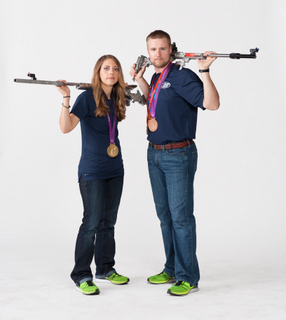 Collegiate teammate and best friend Matt Emmons, a three-time Olympic medalist, says for all that the sport has given her, she too has played a part in giving back to the sport and he’s filled not with sadness today, but with joy and happiness.
Collegiate teammate and best friend Matt Emmons, a three-time Olympic medalist, says for all that the sport has given her, she too has played a part in giving back to the sport and he’s filled not with sadness today, but with joy and happiness.
“Jamie would tell you that she wasn’t the most talented shooter, but she was super motivated, focused, and worked harder than just about anyone,” he admits. “Over the years, she sacrificed a lot to make her dream come true. If I say ‘I’m happy for her,’ it’s because of these two reasons: first, her dream did come true. Even with injury, she lived the experience almost all athletes dream about – to go the Olympics, have the best competition of your life, and win a gold medal. She did that and I am so happy I was there to watch it happen. Next, I’m happy because now that she’s retired, she will be able to enjoy some of the things she sacrificed for that dream. Jamie’s absolutely not a one-dimensional person and she has plenty of other goals and interests. I’m excited to see her turn the page and start writing that next chapter in life.”
Gray is a two-time Olympian who shook off bitter disappointment in 2008 to earn her way to the top of the podium in 2012. In Beijing, she missed a medal in both Air Rifle and Three-Position by 1.8 points total. Over the 120 shots fired, that’s the equivalent of 1/4” or the size of a pencil eraser between medal and no medal.
Long considered one of the top rifle shooters in the world, Gray finally got the hardware that solidifies that recognition on the sport’s biggest stage at the 2012 Olympic Games in London. After an impressive run of making finals in each of four Olympic events she competed in, she finally climbed to the top of the podium and in that instance all the work and sacrifice was justified.
“Jamie went through extremely tough physical challenges on the road to her fourth and fifth-place finishes in Beijing that would have retired most athletes,” said Jamie’s coach, mentor and now USA Shooting Operations Director Dave Johnson. “After painfully just missing the podium in China and overcoming those obstacles, Jamie briefly grieved and then went back to work on setting herself up to win in London.”
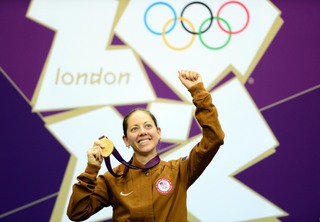 Gray talks about that moment in London when she was able put all her training and sacrifice together to complete her goal.
Gray talks about that moment in London when she was able put all her training and sacrifice together to complete her goal.
“It was a dream come true to stand on the top of the podium representing the United States hearing our national anthem being played. Winning at the Olympics is something I had worked towards since I was 15 years old, and that moment and the entire match will never be forgotten. It was such a blessing to celebrate with coaches, teammates, friends, family and sponsors that helped me get to that moment.”
Jamie’s success, according to Johnson, was based on two key ingredients of elite-level achievement in any walk of life: the discipline to put the hard, often monotonous, work in and the dogged determination to reach her goal.
“Jamie’s legacy in my view will be that there are no shortcuts, there are many very tough challenges on the road to reaching tough goals, and that you don’t leave stones unturned,” said Johnson. “She always sought improvement in a logical and methodical way. She had a deep focus on those skills she wanted to improve on, not just the easier or already mastered parts of her performance. She was never one to let a weakness go unaddressed and never assumed she had the answer to everything, even as she reached higher and higher levels of performance. She challenged the coaches to maximize what they had to offer and then she put the training to work.”
Other highlights of her career including winning the NCAA Rifle Championships both as an individual and in the team event. She was a big fan of team matches throughout her career and thus those stick out in particular including the 2010 World Championship team bronze in air rifle as well as team gold in smallbore.
Given her work ethic and competitiveness, she’ll be successful no matter what endeavor she chooses in life’s next chapter. But for now, she has plenty of things to occupy her time as she plans a November wedding where she’ll tie the knot with Kimber Manufacturing National Account Manager Mike Corkish.
“Life changed dramatically for me when I met the love of my life in 2013 and we decided to marry later this year. “He brings two amazing kids, Morgan and Michael, to our relationship and they have all definitely helped in this decision. Nothing about my decision to retire has been easy, but it sure does help to have the support of my fiancé and my soon to be step kids. I couldn’t ask for Morgan and Michael to accept their father’s and my relationship more and they have all taught me there is more in life than just sport.”
As fiery a competitor as you’ll ever meet, she’ll look to fill the void any way she can.
“I am a fierce competitor in anything I do and I will have to find a way to fill my competitive drive elsewhere in life,” she added. “I enjoy the feeling of competition and the anxiety that comes with competing and I will greatly miss this feeling.”
But Emmons notes that he’s not so worried about the void she’ll have to fill in her life, but rather the sport’s void after her departure.
“The sport of shooting itself won’t change a bit because of her retirement, however. I say that because she is already a part of the sport, its history and legacy, Emmons said. “Every athlete eventually has to retire and move on to the next big thing. It’s not that these people are forgotten or that the sport is worse off. On the contrary, the sport is greater because that person became a part of its history and they left countless things behind them to make the sport better. Jamie was and will continue to be an inspiration for young shooting athletes around the world. People will continue to talk about the qualities she embodied that made her so good. I also know that she will continue to be involved in shooting in some capacity, thereby continuing to spread the knowledge and experience she gained to future generations of shooters.”
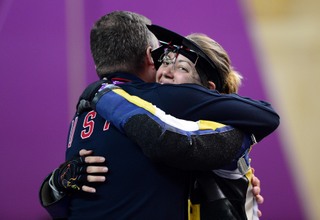 Jamie notes that her parents and brother have always provided the backbone of support from the very beginning of her career. Outside of family, Johnson has always provided the foundation for her success having recruited her to Alaska-Fairbanks when he coached that program.
Jamie notes that her parents and brother have always provided the backbone of support from the very beginning of her career. Outside of family, Johnson has always provided the foundation for her success having recruited her to Alaska-Fairbanks when he coached that program.
“Dave and I have had an amazing coach-athlete relationship and he has been there for me throughout the best and worst times,” Gray said. “We have worked through many shooting problems together and he has always supported me in life. Dave has been a great mentor to me and I will always have many great memories of our ups and downs.”
“It’s been my honor to have been involved with her on this journey,” concluded Johnson. “Of course, there’s never been a dull moment in coaching her. I’m sure we will hear an audible sigh of relief from around the world from Jamie’s competitors upon her retirement—but I’ll enjoy watching her put her experience and skills to work with our next generation of champions that will make that relief short lived.”
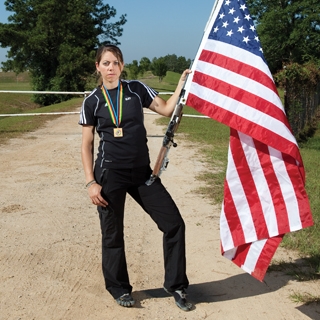

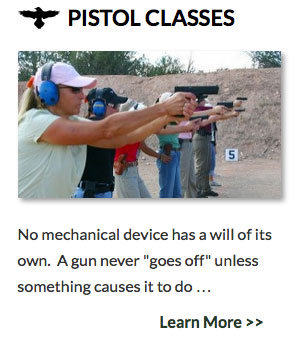

 MidwayUSA
MidwayUSA Ruger Firearms
Ruger Firearms SCCY Firearms
SCCY Firearms Streamlight
Streamlight Action Targets
Action Targets Gunsite Academy
Gunsite Academy
You must be logged in to post a comment Login